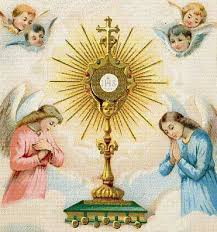
“Jesus took the loaves and when He had given thanks, distributed them” (John, 6:11)
The wonderful miracle related in today’s Gospel illustrates the sympathy of Our Blessed Lord toward those in need of bodily nourishment. But it was also intended by Our Saviour to be a symbol of the far greater miracle He was planning soon to work for the nourishment of men’s souls, by giving them His own body and blood in the Blessed Sacrament. Indeed, it was on the day following the miracle of the multiplication of the loaves that Our Saviour first spoke of the Holy Eucharist, making the sublime promise, “The bread that I will give is my flesh for the life of the world” (John, 6:52).
The miracle of the multiplication of food through the divine power of Our Blessed Saviour is related only twice in the Gospel. But the miracle whereby His priest, in His name, changes bread and wine into Christ’s body and blood takes place thousands of times every day in all parts of the world. Those who benefited by the miracle of the multiplication of the loaves were only a few thousand persons; but since the establishment of the Catholic Church millions upon millions of Our Lord’s followers have received spiritual nourishment through Holy Communion.
It is a sad commentary on the faith and fervour of any Catholic if he allows months and even years to pass by without receiving Holy Communion. He would not deprive his body of the food he needs to maintain his strength; but he does not hesitate to deprive his soul of the spiritual nourishment it can receive so abundantly from partaking of the divine food of Our Lord’s body and blood. He may go to Mass regularly, but he does not seem to realise that the full participation in the Holy Sacrifice calls for the faithful to join with the Priest in partaking of the Victim of the Sacrifice.
If a Catholic does not receive Holy Communion at least once a year, in the Easter Season, he is living in mortal sin. Even if he fulfils this minimum requirement, he will find it very difficult to avoid grave sin when he approaches the altar railing only once a year. Every practical Catholic will receive Holy Communion at least once a month.
Practical Application
If you had been one of the multitude who had benefited by the miracle related in today’s Gospel you would surely have felt highly favoured. But you have a greater privilege in the opportunity to partake of Our Lord’s own body and blood. Why not make the intention to receive Holy Communion at least every Sunday from now to Easter?




